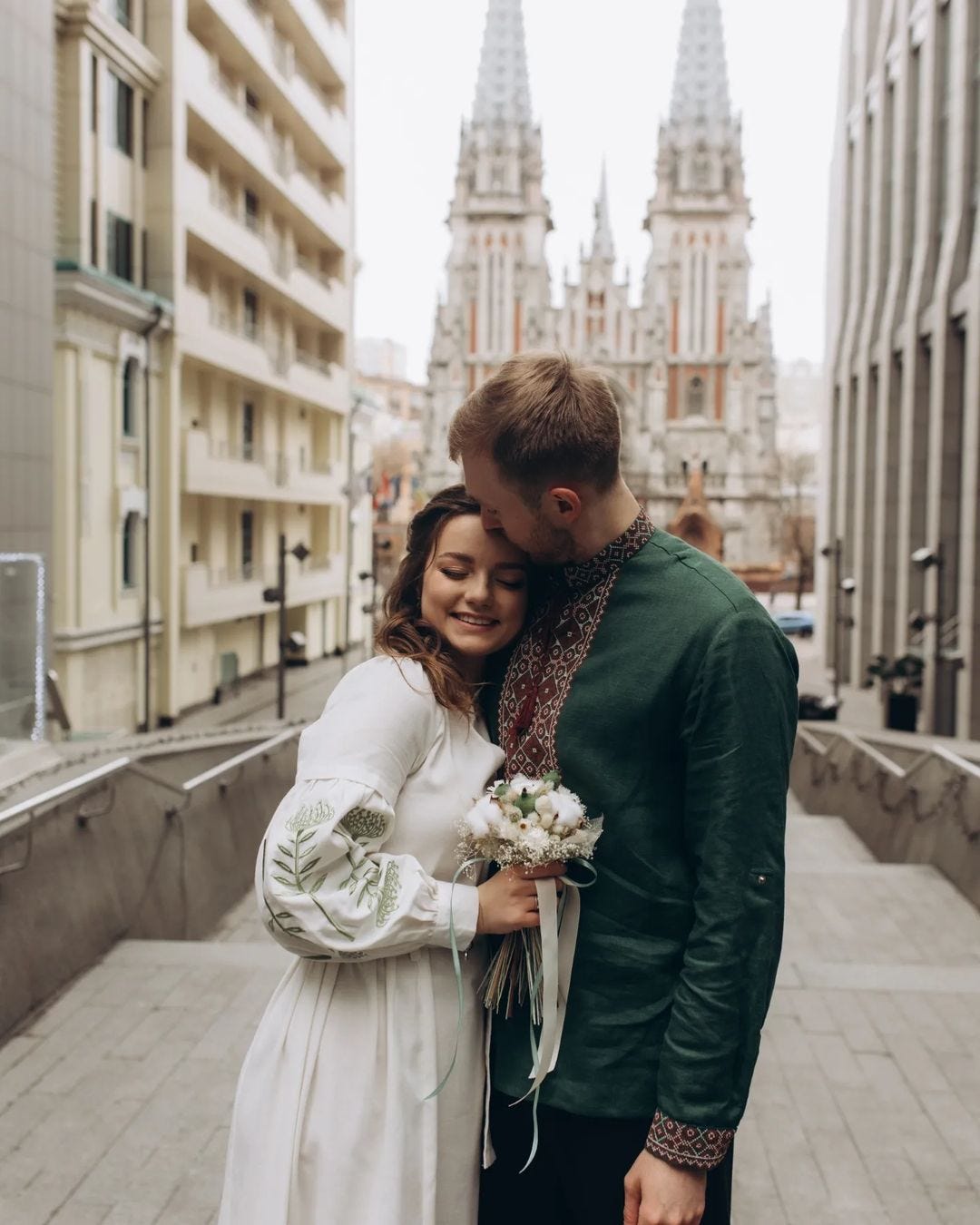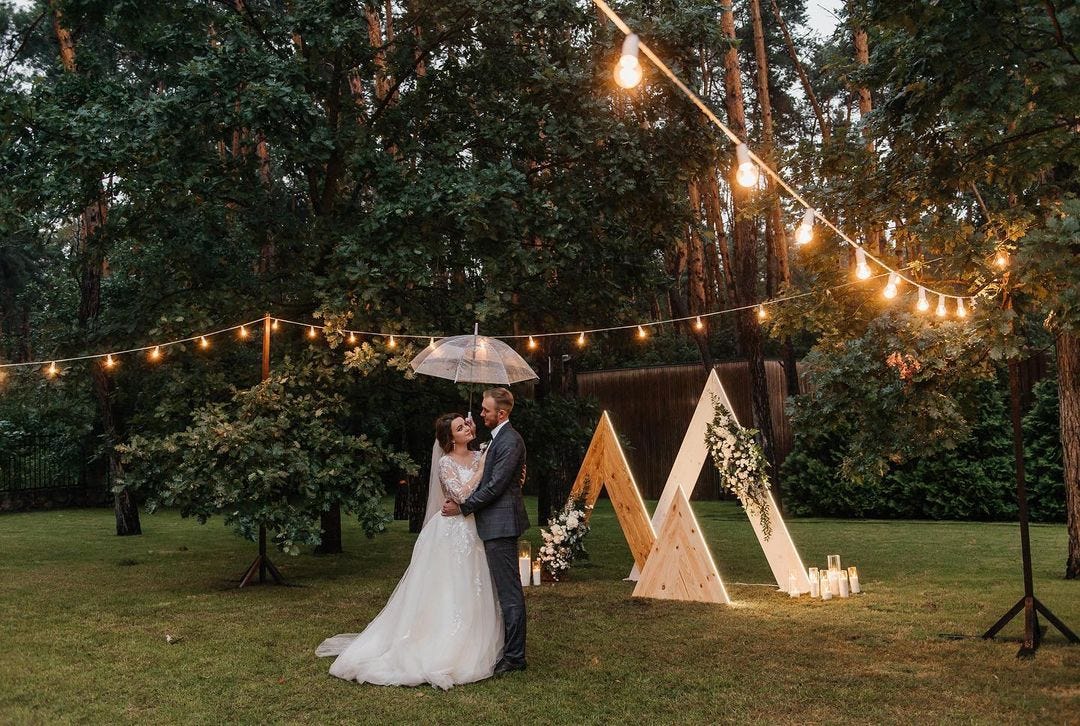Ukraine's war weddings... and divorces
One man describes how exhuming bodies led to his divorce; Ukraine's marriages have skyrocketed, however. Meanwhile, Myroslava describes how she came to have her own war wedding.
Editor’s Note: Our human-centered journalism needs your support to continue. If you appreciate our unique approach to telling stories of the war, please upgrade to a paid subscription now!
Khrystyna and Ivan decided to get married in a church in August 2022, only six months after the start of the full-scale invasion.
The bride felt conflicted about having a celebration, and toyed with canceling the party she’d so wanted. "I didn't know how morally right it was," Khrystyna said.
But her friends and family assured her that life must go on.
War brings out the fiercest of emotions – and we often profile hate or loss at The Counteroffensive. But the war also brings out other powerful feelings, including love: many couples decided at this critical juncture to make vows to one another.
Since the beginning of the full-scale invasion, Ukraine has experienced a "wedding boom." In 2022, the number of registered marriages increased by five percent compared to the year before, according to Opendatabot, a Ukrainian data company.
Much of this ‘wedding boom’ occurred very early that March and April: at the beginning of the full-scale war, marriages were happening at one and a half times the usual rate. And many of the married couples include at least one soldier, as military service members raced to get married before they were sent to the frontlines.
Ukrainians get married even under fire. Some military unit commanders have authority to draw up marriage documents on their own, even if only one of the couple is present. People can also get married online or in registry offices or hospitals.
Khrystyna and Ivan have been together for more than 3.5 years. They met on a trip to Turkey just before the coronavirus outbreak.
"We loved to travel. We both loved winter sports, memes and all kinds of fun stuff. That's what brought us together," Khrystyna told The Counteroffensive.
From the very beginning of their relationship, Khrystyna and Ivan talked about their future together and having a family. Just over a year later, they went on vacation to the mountains in Western Ukraine. There Ivan decided to propose.
"At first the weather was very nice, it was sunny, and… then the sun disappeared, a storm started, it started to rain," she recalls.
Khrystyna was nervous because they couldn't get down, and so she called the state emergency service – they had to be taken away by helicopter, Khrystyna said with a laugh.
"When we got down, [he] said, 'Let's take a picture,' which surprised me a lot because he doesn't like to be photographed. And that's how he proposed!
After the proposal, from watching the news, the couple feared that the situation in Ukraine would escalate and that a wider Russian invasion of Ukraine might actually take place.
Khrystyna and Ivan decided not to wait and to register their marriage immediately, signing their marriage license ten days before the start of the full-scale war.
In Ukraine it is very common to just sign a marriage license at the registry office, and then have a wedding, celebrations and festivities later.
It was only six months into the Russian invasion, and because the country was not yet ready to take on such a big war, many shops were closed. But Khrystyna managed to find the wedding dress of her dreams.
Their wedding, as well as their proposal, was full of mountain themes. Khrystyna and Ivan love mountains, so their wedding had a mountain-shaped arch where they exchanged wedding vows, and each table was a Carpathian peak – significant to the couple or to the country's geography in general.
"It is said that if you want to test a relationship, you have to go to the mountains with that person, because in difficulties everyone is tested," Khrystyna said proudly.
Khrystyna's main concern at the celebration was that there would be no air raids. Khrystyna and Ivan also asked the guests not to give them flowers, but to donate their money to the Ukrainian army. They themselves donated a large part of the money they received that day to the army too.
The only thing that went wrong was torrential rain, but she found a positive side to it: "It is said that rain on a wedding is a sign of prosperity,” she said.
While weddings have surged during the war, the number of divorces has decreased.
The Counteroffensive spoke with Roman Sulyk, a lawyer and head of the family practice at the Prikhodko & Partners law firm, who said that divorces took a big dip during the year of the invasion. The post-invasion divorce figures are still lower than they were before the full-scale war broke out.
Among those who do decide to divorce, Sulyk said, most couples cite different views on life and family as the reason. But often, the real reason was the war.
This is exactly what happened to Yevhen Spirin and his wife, Olena. They are both journalists and met at work. They were married for 7 years. But the war destroyed their happy family life.
Yevhen stayed in Ukraine while Olena went to Poland for safety reasons, only returning to the capital when Russian troops withdrew from the Kyiv region.
"During that time it became clear that I had changed. I did not leave Kyiv, and I was also engaged in exhumations of bodies in the Kyiv region, and then a few months later in the Kharkiv region," Yevhen said, adding in despair:
"I changed a lot, and probably not for the better. And she changed during that time when she was in Poland. When she came back, I was not the same person she married. And she was not the one I married.”
Yevhen and Olena lived like this for a little over a year.
"It was not like a marriage, I could sleep in a different room for weeks at a time. We stopped communicating... Then we developed some separate interests there. She had some hobbies. I had my own business: finding dead bodies," Yevhen said.
And one day Olena came home and calmly told Yevhen that she wanted a divorce. They had no arguments. But it was hard to accept:
"I still feel very bad. It was a surprise. I don't want to say that rationally I didn't understand that it wouldn't happen, but seven years of marriage is a big part of my life. There are things I can't explain to someone else because they just won't understand me.”
The couple got divorced on June 27, 2023. Afterwards, they posted on social media, thanking each other.
"People perceived our couple as an example of relationship resilience during the war. And it was a big shock to everyone,” he said. "There is no aggression between us. We parted ways peacefully.”
After the paywall: a European prime minister who has opposed Ukraine does a 180 degree turn and suddenly promises support; and Myroslava walks us through her own love story and war wedding.
Keep reading with a 7-day free trial
Subscribe to The Counteroffensive with Tim Mak to keep reading this post and get 7 days of free access to the full post archives.









